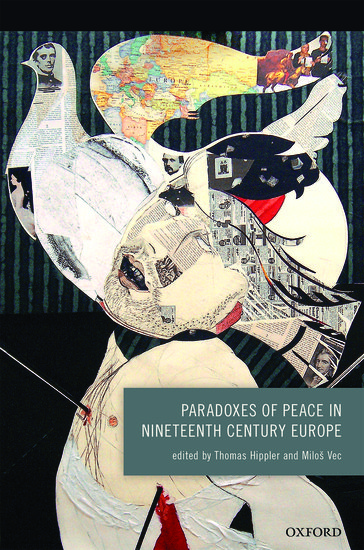(image source: OUP)
Oxford University Press just published Paradoxes of Peace in Nineteenth Century Europe, edited by Thomas Hippler (Lyon/Sciences Po) and Miloš Vec (Vienna).
Book presentation:
'Peace' is often simplistically assumed to be war's opposite, and as such is not examined closely or critically idealized in the literature of peace studies, its crucial role in the justification of war is often overlooked. Starting from a critical view that the value of 'restoring peace' or 'keeping peace' is, and has been, regularly used as a pretext for military intervention, this book traces the conceptual history of peace in nineteenth century legal and political practice. It explores the role of the value of peace in shaping the public rhetoric and legitimizing action in general international relations, international law, international trade, colonialism, and armed conflict. Departing from the assumption that there is no peace as such, nor can there be, it examines the contradictory visions of peace that arise from conflict.Table of contents:
These conflicting and antagonistic visions of peace are each linked to a set of motivations and interests as well as to a certain vision of legitimacy within the international realm. Each of them inevitably conveys the image of a specific enemy that has to be crushed in order to peace being installed. This book highlights the contradictions and paradoxes in nineteenth century discourses and practices of peace, particularly in Europe.
IntroductionMore information on the publisher's website.
1: Thomas Hippler and Miloš Vec: Peace as a Polemic Concept: Writing the History of Peace in Nineteenth Century Europe
Part I: International Law
2: Miloš Vec: From Invisible Peace to the Legitimation of War. Paradoxes of a Concept in 19th Century International Law Doctrine
3: Eliana Augusti: Peace by Code: Draft Solutions for the Codification of International Law
4: Kristina Lovric-Pernak: Aim: Peace - Sanction: War. International arbitration and the problem of enforcement
Part II: Economy
5: Thomas Hopkins: The Limits of 'Cosmopolitical Economy': International Trade and the Nineteenth-Century Nation-State
6: Niels P. Petersson: The Promise and Threat of Free Trade in a Globalising Economy: A European Perspective
7: Lea Heimbeck: 4 Legal Avoidance as Peace Instrument. Domination and Pacification through Asymmetric Loan Transactions
Part III: Actors
8: Matthias Schulz: Paradoxes of a Great Power Peace: The Case of the Concert of Europe
9: Adrian Brisku: The Holy Alliance as 'An Order of Things Conformable to the Interests of Europe and to the Laws of Religion and Humanity'
10: Thomas Hippler: From Nationalist Peace to Democratic War: The Peace Congresses in Paris (1849) and Geneva (1867)
11: Susan Zimmermann: The Politics of Exclusionary Inclusion. Peace Activism and the Struggle on International and Domestic Order in the International Council of Women, 1899 - 1914
Part IV: Values
12: Oliver Eberl: The Paradox of Peace with 'Savage' and 'Barbarian' Peoples
13: Stefan Kroll: The Illiberality of Liberal International Law: Religion, Science, and the Peaceful Violence of Civilization
14: Mustafa Aksakal: Europeanization, Islamization, and the New Imperialism of the Ottoman State
Epilogue
15: Bo Stråth: Perpetual Peace as Irony, as Utopia, and as Politics


No comments:
Post a Comment
Note: Only a member of this blog may post a comment.